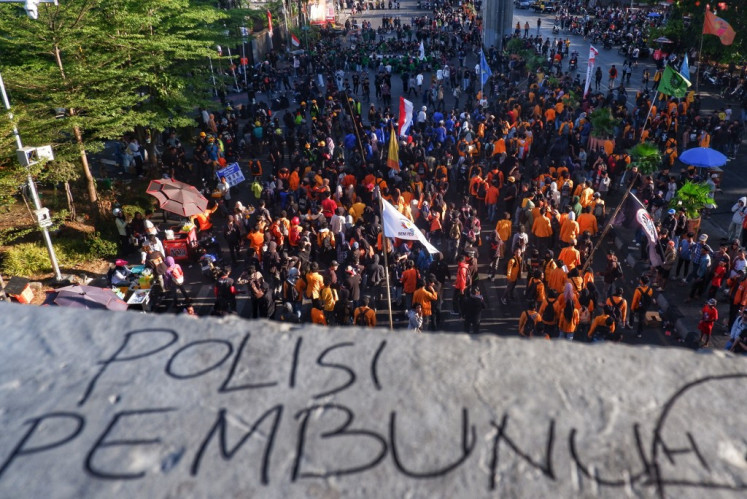Popular Reads
Top Results
Can't find what you're looking for?
View all search resultsPopular Reads
Top Results
Can't find what you're looking for?
View all search resultsA look at trafficking in Asia
'Men carry a huge responsibility in ending violence against women
Change text size
Gift Premium Articles
to Anyone
'Men carry a huge responsibility in ending violence against women. Male parliamentarians hold tremendous capacity to bring this to legislation,' says Tissa Karalliyadda, minister of Child Development and Women's Affairs of Sri Lanka.
Karalliyadda is also chair of the standing committee of the Asian Forum of Parliamentarians for Population and Development (AFPPD).
The forum aims to address the 'increased feminisation of migration' in the region. Its first project is to discuss ways by which governments can address the issues of violence against women with a focus on child marriage in South Asia and trafficking in Southeast Asia.
Last week, members of the standing committee along with Southeast Asian MPs met here to discuss trafficking issues through a 'gender lens' and to formulate policy actions and national responses to address trafficking and violence against women. They also launched last Thursday a 'policy brief' on human trafficking in the region, providing policymakers 'with in-depth understanding of trafficking cases in each country, consequences in practice, policy and legal framework, and policy recommendations'.
Stressing the 'urgency' of the issue, Rep. Teddy Baguilat of Ifugao linked the rise in sex trafficking to 'widening income disparities' that have resulted in increasing 'feminisation' of overseas work. 'We need to fully implement the laws against trafficking,' he said.
AFPPD executive director Mon San Pascual said the standing committee and issue brief had been 'planned by male parliamentarians' in the region in recognition of the need to 'tackle issues of violence against women'. But he stressed that sex trafficking is not the only form of trafficking that needs to be curtailed by law. There is also forced labour, 'under slavery-like conditions'.
Partnering with AFPPD in the development of the issue brief were AusAID, the Australian government's overseas aid programme, and various UN agency offices in the region.
* * *
An overview of the issue says that the data that exist 'is usually the number of victims identified, and traffickers prosecuted by state authorities.' But this is just the tip of the bigger problem. 'Most victims and traffickers are not identified and most traffickers are not prosecuted,' says the document. 'Anti-trafficking policies tend to assume that the needs and priorities of those not identified as trafficked will be the same as for those who are; however, the little research that has been done in this area suggests otherwise.'
Another problem is what the writers call 'gender biases within existing data'. 'With the focus so often solely on women and girls, it is difficult to estimate the number of men and boys who are trafficked as so few programs exist to identify or support them and their profile is so low.'
Compounding the problem is that 'many survivors do not want to be identified or 'labelled' as trafficked, perhaps because of the stigma attached to that word, or because they do not wish to return home'.
These gaps in data 'have consequences beyond data collection', the study asserts. 'Identifying a person as trafficked places obligations on the State to provide them with a range of services and to investigate and punish the perpetrators. Authorities making the determination may view individuals who fit the definition of trafficking as smuggled or as irregular migrants, who do not evoke the same level of legal protection, then place them in detention pending deportation. This constitutes a breach of international law.'
* * *
The issue brief in its section on the Philippines locates the issue of trafficking within the context 'of the migration of over one million Filipinos each year to work abroad, the highest rate in Asia'.
The majority of the 10 million Filipinos working abroad are women, although men, too, are trafficked for illegal labour as well as for sexual purposes. 'Trafficking for organ removal has also been documented,' says the study, while rural-to-urban trafficking is also an issue.
In terms of laws penalising trafficking, 'the Philippines takes a leading role in counter-trafficking at the regional and international level'. Our government criminalised all forms of trafficking in 2003.
'While the anti-trafficking law does not make an explicit link with violence against women,' says the study, 'the Magna Carta of Women recognizes trafficking as a form of VAW.' It even goes beyond international human rights law, 'framing prostitution as a form of VAW' while also criminalising 'the purchase of sex'.
* * *
But there are problems with the 'outright conflation of trafficking with prostitution', among them the tendency to focus attention on the sex sector, 'sweeping up individuals who sell sex but were not trafficked'.
Another problem is that 'rescue operations in this sector often fail to respect the rights of women working in the raided venues, including their right to privacy, and women who have been trafficked into the sex sector report being treated like criminals'.
Also a drawback in this focus on sex trafficking is that 'trafficking in other labor sectors escapes scrutiny and those perpetuating the exploitation are able to do so with impunity. (The low numbers of labor inspectors) across the country in part explains the low rate of identified victims of trafficking for labor exploitation'.
The situation is complicated and tends to create even more problems than was initially identified. More on this tomorrow.










